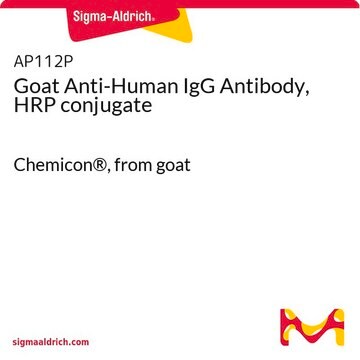AP120A
Goat Anti-Human IgA Antibody, IgG, and IgM, Alkaline Phosphatase
Chemicon®, from goat
About This Item
Recommended Products
biological source
goat
Quality Level
conjugate
alkaline phosphatase conjugate
antibody form
F(ab′)2 fragment of affinity isolated antibody
antibody product type
secondary antibodies
clone
polyclonal
species reactivity
human
manufacturer/tradename
Chemicon®
technique(s)
ELISA: suitable
western blot: suitable
isotype
IgG
shipped in
wet ice
target post-translational modification
unmodified
General description
IgM normally constitutes about 10% of serum immunoglobulins. IgM antibody is prominent in early immune responses to most antigens and predominates in certain antibody responses such as ′natural′ blood group antibodies. IgM (with IgD) is the major immunoglobulin expressed on the surface of B cells.
Monomeric IgA constitutes 5-15 % of the serum immunoglobulins whereas dimeric IgA is localized to mucosa surfaces such as saliva, gastrointestinal secretion, bronchial fluids and milk. Mucosal IgA plays a major role in host defence by neutralising infectious agents at mucosal surfaces. The production is usually local and antigen specific IgA producing B-cells can be found in regions under the lamina propria where they mature into dimeric IgA producing plasma cells. IgA deficiency is the most common immunodeficiency that may affect both serum and mucosal produced IgA.
Specificity
Application
Secondary & Control Antibodies
Whole Immunoglobulin Secondary Antibodies
1:5,000-1:50,000 dilution can be used.
Optimal working dilutions must be determined by the end user.
Quality
ELISA:
1:5,000-1:50,000 diltution can be used.
Physical form
Storage and Stability
After reconstitution this product is stable for several weeks at 2-8°C as an undiluted liquid. DO NOT FREEZE. For extended storage after reconstitution, add an equal volume of glycerol (ACS grade or better) to make a final concentration of 50% glycerol and store at 2-8°C for up to 12 months.
Please note that the concentration of protein and buffer salts will decrease to one-half of the original after adding glycerol.
Legal Information
Disclaimer
Not finding the right product?
Try our Product Selector Tool.
Signal Word
Warning
Hazard Statements
Precautionary Statements
Hazard Classifications
Acute Tox. 4 Dermal - Aquatic Chronic 3
Storage Class Code
11 - Combustible Solids
WGK
WGK 3
Certificates of Analysis (COA)
Search for Certificates of Analysis (COA) by entering the products Lot/Batch Number. Lot and Batch Numbers can be found on a product’s label following the words ‘Lot’ or ‘Batch’.
Already Own This Product?
Find documentation for the products that you have recently purchased in the Document Library.
Our team of scientists has experience in all areas of research including Life Science, Material Science, Chemical Synthesis, Chromatography, Analytical and many others.
Contact Technical Service








